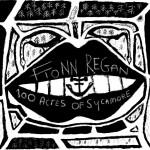
Fionn Regan 100 Acres Of Sycamore
(Heavenly Records)
If you want something done well, do it yourself. So said Fionn Regan before recording his last album, after what should have been his second album got locked away in a vault by his unsatisfied record label, never to be seen again. It turned out to be a liberating experience, as he got to write the record he set out to make: a natural progression from the quaint acoustic sounds of his debut, The Shadow Of An Empire was more upbeat, more up-tempo, and an all-round rockier affair than his hushed, acoustic-based debut.
It’s fair to say that many of those who loved Regan’s debut will have been slightly disappointed by this left-turn, which often leaned a little too far towards the clichéd garage rock sounds of bands like The 22-20s, even delving into country music at times. It’s no coincidence that the best tracks were the ones that sounded most like the previous album. And if you share that view, you’ll be pleased to learn that 100 Acres Of Sycamore is a return to that quiet and considered sound, and is in some respects his most well-rounded record to date.
Immediately, the most striking thing is the upgrade in production. Title track 100 Acres Of Sycamore opens the album on airy strings and moody, reverb-soaked vocals: backed by what sounds like a small orchestra, the song resonates with an ambience that is dark yet grandiose. The rumbling bass drums and upright bass give the track an almost theatrical quality that makes for a great opener.
Throughout the album, Regan’s knack for an irresistible guitar riff is very evident, and part of you wishes more of the tracks were just him and his guitar, recorded as they were written. But there’s no denying that the orchestral arrangements breathe life into these tracks, and most of the time it’s a joy to listen to.
Very occasionally, however, there’s perhaps a little over-reliance on the string crescendos and clattering percussion, taking the listener out of the quaint countryside retreat you’d imagine this album is recorded in and into movie territory. Lyrically, the frequent nature references and flowery language can come across just a little too twee. In songs like For A Nightingale, you’re almost transported into a Disney-like world where the sun always shines and bunnies and butterflies are best of friends. I don’t know about you, but I live in a reality where that bunny would eat the butterfly given half the chance, and then the evil little bastard would eat the resulting droppings. Don’t listen to this album when you’re already having a good day: listen to it when you want to pretend the world isn’t a cold, dark place.
20 February, 2012 - 15:34 — Joel Stanier